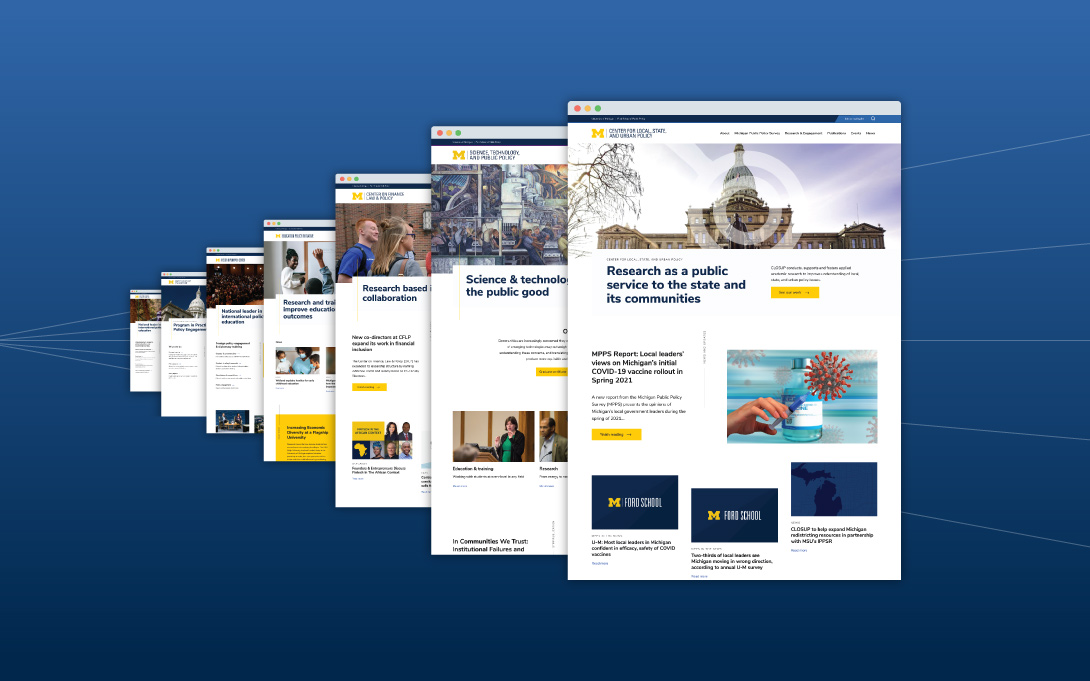
Seven of the Ford School’s dynamic research centers have launched new websites. Building on the Ford School’s own modern web design and technical capabilities, the new websites convey the energy and innovation of each center. Participating research centers include: Center for Local, State, and Urban Policy (CLOSUP), Center on Finance, Law, and Policy (CFLP), Education Policy Initiative (EPI), International Policy Center (IPC), Program in Practical Policy Engagement (P3E), Science, Technology, and Public Policy (STPP), and the Weiser Diplomacy Center (WDC).
Each of the centers cover different policy areas, but their web needs were similar: upgraded open-source database technology and a platform for telling stories about research, community partnerships, and student opportunities to a range of target audiences. New features put a spotlight on important work, improve accessibility, and pull in related news and events from the Ford School site to keep visitors informed. All of the components and features developed during the school’s 2020 website redesign were brought over, and design tweaks allow research centers to customize the look and feel of their site.
Chris Myers, the Ford School’s assistant director for digital strategy, led the team that supported each of the centers in the redesign.
“Each research center team put in countless hours over the past five months to create their sites,” said Myers. “It was a great partnership between the school and the centers.”
For some centers, the website redesign was an opportunity to refresh and reorganize their content in new ways so their audiences could more easily find information. Others wanted to showcase projects with community partners or student engagement opportunities.
"CLOSUP's research has produced a treasure trove of resources to help inform policymaking and stakeholders' understanding of the policy environment, so we were thrilled by the opportunity to disseminate the resources more effectively through a modernized website,” said Tom Ivacko, executive director of CLOSUP. “The resources include over 150 formal research reports, scores of working papers and event videos, and over 100 downloadable datasets and thousands of pre-run data tables from the MPPS surveys, all covering a remarkably wide range of state and local policy topics. The new tagging system that cross-links these resources by their common topics was a significant reason we jumped at the chance to build a new website."
Others were excited by the flexibility of the new platform, new navigation features, and storytelling capabilities.
“During the last year as we spent most of our lives in Zoom meetings and online, it’s become crystal clear that we need an engaging site like this to disseminate our research findings and promote our impact on education today,” said Nicole Wagner Lam, director of EPI. “We think the new site does a great job of helping students, educators, researchers, and policy makers access the rich research, training programs, and partnerships that are central to what we do.”
"STPP is growing rapidly in all directions, and we are excited to have a website that can grow with us, especially one that beautifully showcases everything we do across research, education, and public engagement," said Molly Kleinman, program manager of STPP.
“The new CFLP website improves navigation and makes it easier to find information about our research, events, and work with Detroit businesses,” said Christie Baer, assistant director of CFLP. The new site includes a fun new feature—a searchable database of past speakers. This will make it easier for researchers, regulators, and practitioners to find each other and collaborate after conferences.
“The newly designed website will allow P3E to better tell our story of supporting engaged learning, policy research, and policy impact, and to make our resources and opportunities more accessible to the Ford School and U-M communities,” said Liz Gerber, faculty director of P3E.
"The new websites reflect our vibrant international policy community and our courses, events and programming, showcase faculty and student policy engagement and offer easy navigation through all IPC/WDC funding opportunities,” said Zuzana Wiseley, program coordinator for WDC.
To complete the work, the Ford School contracted with Palantir.net, a consultancy for complex digital systems founded in 1996 and based in Evanston, Illinois. Palantir contracted with the Ford School to launch the school’s all-new website in 2020.
You can view all the new research center sites here:
